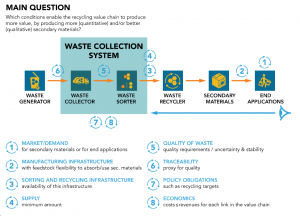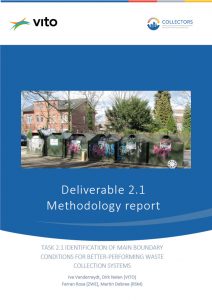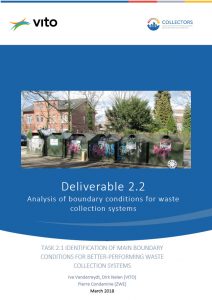Analysis of boundary condition
In parallel, a study of boundary conditions and solutions for implementation of waste collection systems was conducted. The objective was to analyse the role of waste collection system in the recycling value chain, and identify the conditions under which waste collection system can contribute to effective and efficient material recycling, by producing more and/or better secondary materials.
The approach consisted in looking at the recycling value chain from two perspectives:
- From a circular economy perspective, i.e. to what extend the sorted materials meet the quality requirement for recyclers;
- From a societal acceptance perspective, i.e. to what extend the collection systems fits with the inhabitants’ behaviours and opinions.
The identified boundary conditions for the recycling value chain are presented on the following figure:

Among these boundary conditions, waste supply, quality of waste, and traceability were identified as the ones directly related to waste collection systems.
The study also analysed the different organisations of waste collection systems identified by the consortium, and the possible end applications of sorted materials, along with the quality requirements.
In conclusion, the study highlighted the significance of quality of sorted waste, and identified it as the dominant factor in enhancing the performance of recycling value chains, along with a better alignment of the quality of sorted materials with the quality requirements of end-applications.
Relevant publications
To discover more on the selection of case studies, have a look at the following publications:
 D2.1 Methodology report on the boundary conditions
D2.1 Methodology report on the boundary conditions
The COLLECTORS project conducted some researches to identify the role of waste collection systems within the recycling value chain, and determine what conditions lead to the collection of more quantities of quality materials, in order to produce more value to the recycling chain. This report details the method used to identify these “boundary conditions”.
 D2.2 Analysis of boundary conditions for waste collection systems
D2.2 Analysis of boundary conditions for waste collection systems
This report focuses on the identification of “boundary conditions” for waste collection system to positively contribute to the circular economy, e.g. by producing sufficient quantities of sorted materials available for high quality recycling. It focuses on the three waste fractions covered by the project: paper and packaging waste, WEEE, and construction and demolition waste.